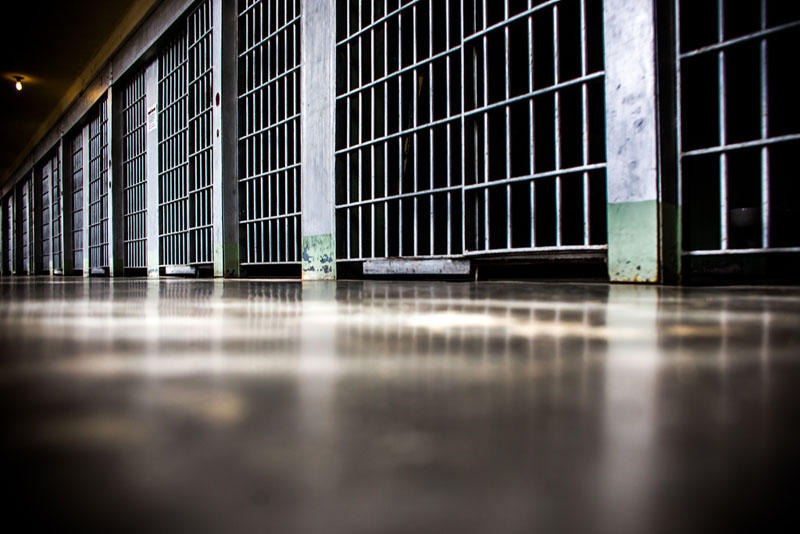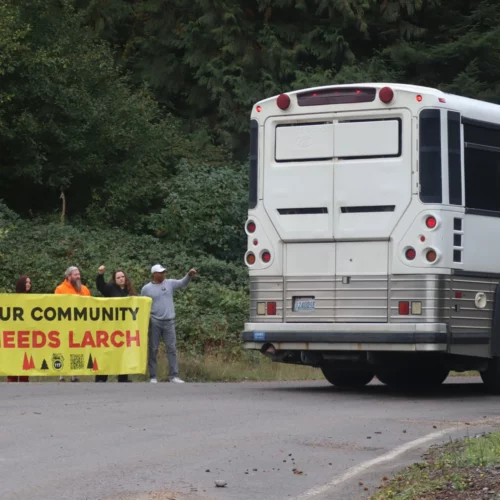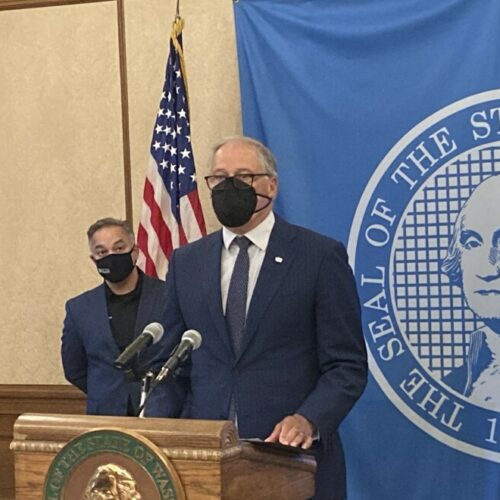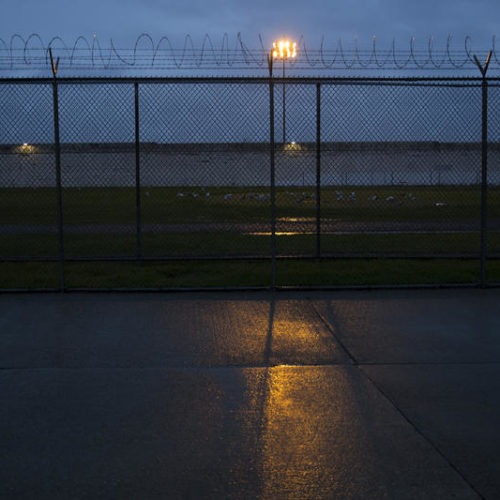
COVID-19 Cases In Yakima Jail And Coyote Ridge Prison In Eastern Washington Continue Rising
READ ON
BY ASHLEY HIRUKO / KUOW & ENRIQUE PÉREZ DE LA ROSA / NWPB
Even as Washington counties work to reopen in various phases of the state’s four-phase reopening plan, county jails and state prisons and corrections institutions continue to deal with coronavirus outbreaks and COVID-19 infections.
As of Thursday, June 18, at least 19 inmates have tested positive for COVID-19 at the Yakima County Jail. The second-floor unit is now under quarantine.
Jeremy Welch is Chief of Care and Custody at the jail and says the virus got past the jail’s screening process.
“When someone is booked into jail there’s a screening. Questions are asked. Temperatures taken by the officers,” Welch says. “And then a second screening takes place as well by medical staff. And then we’ve also put in place a 14-day unit where they’ll go to for 14 days and as long as they remain symptom-free, then they get to go out to general population.”
The jail is currently awaiting test results for 13 more people, according to Welch. The jail also cut its inmate population in half at the start of the pandemic, as did the state Department of Corrections. Because of the increased capacity statewide, the DOC terminated a contract with the Yakima County Jail to house up to 60 incarcerated women.
Coyote Ridge
“No water. No access to (the) bathroom,” said a mother whose son is at Coyote Ridge. “Older men are having accidents in their cell. Next day, still not cleaned up. No clean masks.”
Dalyce Jones and her husband, an inmate at Coyote Ridge Corrections Center in Franklin County, north of Pasco, used to chat on the phone about baseball, or their two kids.
Now their phone calls center on the ambulances that come every other day at Coyote Ridge, and the stretchers that take out inmates infected with coronavirus.
Their two kids, ages 4 and 8, are distraught for days after their father calls, worried he’ll get sick with COVID-19 — like more than 100 others who live and work at the Franklin County prison.
As of Monday, June 15, the Department of Corrections reported that 79 inmates and 34 staff have contracted the virus. Coyote Ridge has the highest prisoner capacity in Washington state.
Anxiety has increased for Jones and her children, given that she hasn’t heard from her husband since June 9.
“What are we doing to our own people?” Jones asked. “They’re trapped in a box just waiting to get sick.”
The Department of Corrections put the Medium Security Complex under restricted movement last week. They said they did this to get a handle on the outbreak, and because Coyote Ridge is in a rural part of the state, between Yakima and Spokane, far from medical facilities.
Family members of inmates said under restricted movement, inmates are only allowed to leave their cell for about 30 minutes every two days. The Department of Corrections said Monday that they had changed this to 30 minutes per day, for the more than 1,800 inmates that reside within the complex.
This is considered extreme for prisoners. For perspective, those in solitary confinement get one hour per day out of their cell. Currently at Coyote Ridge, prisoners get one hour per every two days.
Family members of Coyote Ridge inmates reached out to KUOW by email, asking that their names not be used for fear that their loved ones would be retaliated against.
They report that sick inmates have been transported to a makeshift clinic in a prison chapel an hour and a half away, or driven across the state by bus to Monroe. Meanwhile, prisoners wanting to get tested are being refused and forced to stay in their cells to limit possible exposure to other prisoners. Those in cells without toilets resort to peeing in bottles because they are not let out to use the restroom in time.
“The inmates are begging for basic human rights such as access to toilets and showers,” said one mother. She said her son has a compromised immune system.
“The increase in cases at (Coyote Ridge) has been a direct result of their ineffective ability to identify and control the staff bringing this virus into the system,” the mother continued.
“The (Department of Corrections) in turn has now blamed the inmates for spreading. Compare the numbers (at Coyote Ridge) with the other facilities and you will clearly see that.”

File photo. Earlier in the pandemic in Washington state, Columbia Legal Services has filed a lawsuit against the state seeking the early release of some inmates to reduce the risk of a coronavirus outbreak. CREDIT: Thomas Hawk / Flickr -TINYURL.COM/HA5H3WP
Another mother described the conditions that her son faced while in lockdown. “No water. No access to (the) bathroom. No egress in case of emergency. Older men are having accidents in their cell. Next day, still not cleaned up. No clean masks.”
Coyote Ridge has the highest number of confirmed cases among all Washington state prisons. Their cases have surpassed the numbers at the Monroe Corrections Complex, an earlier hot spot, which currently has 18 inmates and 10 staff confirmed to have the virus.
A staff member who decided to get themselves tested in early April was the first positive test connected to Coyote Ride, according to minutes taken from a local family council meeting.
At the time, six inmates had been tested. Five came back negative and one was pending. Coyote Ridge did not test their staff, per the meeting minutes, but they were encouraged to see their own physician if they had COVID-19 concerns. The prison said it did not know how many staff had been tested.
As of Friday, 33 people showing symptoms have been placed into isolation, according the Department of Corrections. About 1,815 others without symptoms, but a known exposure, have been placed in quarantine but have not been tested.
When KUOW asked why the cases at Coyote Ridge continue to grow, the Department of Corrections replied by email: “It is unclear at this time why this facility has experienced a higher level of positive cases.”
KUOW spoke with eight people with direct knowledge of what is happening at Coyote Ridge — one current prisoner, a former prisoner, and six people with relatives or spouses at the prison currently.
Among their concerns: A lack of transparency on COVID-19 related information; the decline of outside time for inmates confined to their cells on lockdown to prevent the spread of the virus; and staff that carpooled to work from the Tri-Cities, who then worked at both the medium security unit, and minimum security unit.
They called for another mass early release for inmates and an expansion on who is tested. Currently only those showing symptoms are being tested for coronavirus at Coyote Ridge. This means inmates have to disclose when they’re experiencing symptoms.
On June 4, Gov. Jay Inslee announced Washington state would expand testing to people who are showing symptoms, exposed to the virus, or who live in a congregate setting.
“This includes job sites, like meat packing plants, agricultural sites, as well as low-income housing, long-term care, homeless shelters, and similar situations where the risk of infection is high,” the governor said.
The Office for the Corrections Ombuds would like this to include prisoners. For more than a month, that office has recommended universal testing for all inmates and staff at all Washington state prisons.
“We have stated that mass testing would be the best, particularly at a facility with an outbreak like CRCC,” said Joanna Carns, director of the Office of the Corrections Ombuds.
She said the office is pushing for, at the very least, targeted testing for vulnerable inmates who have had close contact with a positive person. But the Department of Corrections hasn’t acted on this advice.
Outside agencies have called on the Department of Corrections to expand testing within prisons. Disability Rights Washington asked that they test those within the Sage unit at Coyote Ridge, where a vulnerable population of assisted living inmates live.
“(Disability Rights Washington) has feared that COVID would reach that facility, endangering the people living in DOC’s only assisted living unit, and with the recent and swift increase in cases at that facility, immediate testing for staff and inmates on that unit should be implemented,” the nonprofit wrote to the Department of Corrections on May 26.
They said the move would be in line with the governor’s announcement that all nursing home residents and staff in the state be tested, to keep these populations safe, identified, and treated as early as possible.
Inmates at Coyote Ridge, who were exposed to people showing symptoms, were denied testing when requested.
Karlina Tasker, who lives in New Mexico, said her husband and his cellmate both made the ask after their cellmate fell ill in April.
“He was like, ‘If my friend is in isolation and he’s sick, I want to get tested,’” Tasker said.
His written request was denied. Instead of determining if Tasker’s husband had contracted COVID-19, they kept him and his cellmates within their dry cell for 14 days, while others were allowed to move about freely, Tasker said. Dry cells don’t have toilets or running water.
On June 11, Tasker’s husband was again confined to his cell because of the growing outbreak. He waited two and a half hours to use the bathroom.
“I had to pee in a bottle … I couldn’t hold it anymore,” reads an electronic note to Tasker, from her husband.
Tasker’s husband is healthy, and has no symptoms, but many medically vulnerable and elderly inmates remain behind bars in Washington state. A lawsuit filed by Columbia Legals Services, on behalf of incarcerated plaintiffs, called for those most vulnerable to COVID-19 to be released from prison.
While the Washington State Supreme Court denied the petition, the Department of Corrections moved to release more than 1,000 inmates early. However, the Department of Corrections used the length of sentence remaining and if the crime was violent or not as factors for release. Inmate vulnerability was not their main consideration.
Lack of transparency has weighed on families of inmates, too.
Coyote Ridge families told KUOW that when their loved ones at the prison do fall ill, they receive little information about how they are doing. Sometimes they’re relocated hours away, without prior notice.
Inmates ill with coronavirus at Coyote Ridge are being transferred by bus to “ a regional care facility” at the Airway Heights Corrections Center, located about an hour and a half northeast of Coyote Ridge. This facility is housed in the chapel, according to a site visit report from the Office of the Corrections Ombuds.
“New medical care beds were staggered throughout various rooms in the building, to provide for greater social distancing,” the report says.
Other “regional care facilities” are located in prisons around the state. These facilities are areas set aside at the Monroe prison and Washington Corrections Center, although the Department of Corrections said the Airway Heights care facility is the only one being used currently for COVID-19 positive patients.
Nita Haug-Zyph found out her son was sick at the end of May. She didn’t hear from him again until a week later, after he had tested positive and was moved to a one-person cell at the Monroe Corrections Complex, more than 200 miles away. He told her that he gets a shower once a week.
The inmate traveled by bus, he told Haug-Zyph, and was with about five others who were sick.
“He told me that the only time he would really be moved out is if he was sick enough to have to go to a bigger hospital and then they would move them,” Haug-Zyph said. “They did have that facility at Airway Heights, because it was closer to the hospital. I don’t understand why they moved him all the way to Monroe.”
At Monroe, inmate Terry Kill told his wife Twyla that he has seen inmates with COVID-19 arrive by bus, and that the guards who go to these inmates wear hazmat suits.
“My husband works in the DOC warehouse at Monroe, and he saw the bus come in today with COVID positive cases,” said Twyla Kill by text message. “He said the bus has a separate cab and trailer, and that they suit up. He thinks 25 came today, but can’t confirm.”
Back at Coyote Ridge, Jay Jones, an inmate, was frustrated. His media player, which he used to communicate with people on the outside, was malfunctioning.
And he felt stuck: He was placed on a list to go to a minimum security facility, prior to the pandemic, but remained in medium security, where the outbreak continues to grow. He said inmates there are scared. And when inmates raise concerns, they feel ignored.
“Everyone is basically fed up with how they’re treating us,” he said. “They’re not really listening to what we have to say or considerate to us and our families. It’s been really hard to stay focused.”
Most frustrating, he said, is not being clued into the growing number of cases. Jay Jones and other inmates reach out to those on the outside to get the prison’s COVID-19 case report for the day.
His mother, Joanna Jones (no relation to Dalyce Jones, above) obliges. When she pulls the numbers up, to read to her son over the phone, she hopes they haven’t changed. But they do. They increase.
“I want the number to stop growing,” Joanna Jones said. “I want them to get a better handle on this. The superintendent is not doing his job.”
Ashley Hiruko reports for Northwest News Network member station KUOW. Enrique Pérez de la Rosa covers Yakima and central Washington for NWPB.
Related Stories:

Washington closes Larch prison as staff push back over jobs, wildfire risk
Larch staff have pushed back against the closure of the minimum security since plans were announced this summer, including filing a lawsuit that they hoped would pause the closure. A

Unvaccinated Washington State Employees Face Their Last Day On The Job
Monday is the deadline for Washington state employees, healthcare and long-term care workers and those working in the education field to be fully vaccinated. Those who aren’t could be out of a job by day’s end. Some of the state employees who face termination got exemptions, but not a workplace accommodation so they could stay on the payroll.

Alternative To Prison Will Be Allowed In Washington For Some People With Mental Illness
Under Washington’s new Mental Health Sentencing Alternative, judges will have the option to sentence a person to community supervision and treatment in lieu of prison.
















